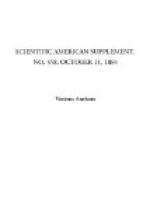Among the conditions favorable to the multiplication of the malarial ferment contained in the soil, and to its dispersion through the superjacent atmosphere, there are three which are absolutely essential, and the concurrence of which is indispensable for the production of bad air (malaria). First, a temperature which does not fall below 20 deg.C. (67.5 deg.F.); next, a very moderate degree of permanent humidity of the soil; and finally, the direct action of the oxygen of the air upon the strata of earth which contain the ferment. If a single one of these three conditions be wanting, the development of malaria becomes impossible. This is a point of prime importance in the natural history of malaria, and it gives us the key to most of the methods of sanitary improvement attempted by man.
Let us see first what can be done in this direction without the labor of man. For nature herself makes localities salubrious by suspending for a greater or less time the production of malaria. It is thus that winter brings about in every country a freedom from malaria which is purely thermic, for it is due simply and entirely to a sinking of the temperature below the required minimum. Indeed, if the temperature in winter rises above this minimum, there are often sudden outbreaks of malaria. Sometimes, during very warm and dry summers, the heat extracts all the humidity from the malarious soil, and thus procures for us a freedom from the disease which is purely hydraulic. This may continue for a long time (as happened in the Roman Campagna during the years 1881 and 1882), but may also be completely destroyed by a single shower. Nature also sometimes renders a district healthy in a manner purely atmospheric, by covering a malarious soil with earth which does not contain the malarial ferment, or with a matting formed of earth and the roots of grasses growing closely together in a natural meadow.
In the attempts of purification by suspending the malarial action, which have been devised by man, the same thing has been done; that is to say, it has been sought, to eliminate at least one of the three conditions essential to the development of the specific ferment contained in the infected soil. Naturally, they have not thought of bringing about a thermic purification, such as nature produces in winter, because of the impossibility of moderating the action of the sun; but they have tried from all time to procure hydraulic or atmospheric purifications, and sometimes to combine these together in a very happy way.
The hydraulic systems are very numerous, for the problem which is presented, namely, that of depriving the ground of its humidity during the hot season, necessitates different solutions according to the nature and the bearing of the soil. Sometimes this is done by digging open or closing ditches intended to draw away large bodies of water. At other limes a system of drainage is established, by means of which the water




